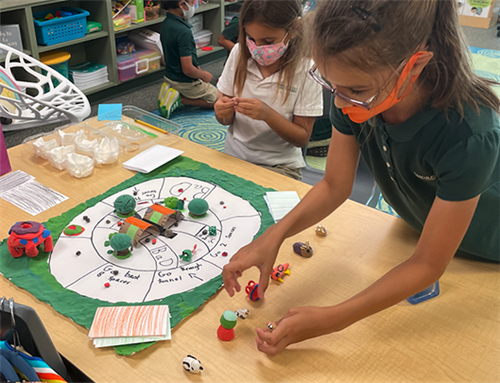

The Project Approach in Lower School
Source/Author: Dr. Lisa Bianco, Head of Lower School
October 07, 2021
The Lower School at Shorecrest embraces The Project Approach, which is rooted in the work of Lilian Katz and Sylvia Chard. Dr. Chard and Dr. Katz developed a group of international educators, known as the Project Approach Teacher Education Network (PATEN), to help train future generations of teachers to successfully use project work in classrooms.
Shorecrest Lower School defines projects as an in depth investigation of a topic or theme worthy of study that allows children to follow their questions and interests. This year's focus on problem- and inquiry-based Project Based Learning is in full swing. It is important that whatever Chargers study, they have access to age appropriate primary and secondary resources to support their learning.
Shorecrest Lower School defines projects as an in depth investigation of a topic or theme worthy of study that allows children to follow their questions and interests. This year's focus on problem- and inquiry-based Project Based Learning is in full swing. It is important that whatever Chargers study, they have access to age appropriate primary and secondary resources to support their learning.
Through project work students explore a topic or theme with each other in the classroom (with lots of hands-on learning), out of the classroom (doing field work), and side by side with wonderful guest experts. Essential questions as well as students' ongoing questions drive the study -- and while they are discovering answers to their questions, the class is co-constructing knowledge. The work of inquiry is about “how we come to know” and teaches children how to learn as well as the skills, knowledge, and habits of mind that we aim for children to acquire.
In the Lower School the Project Approach is modified using the Understanding By Design framework in order to assure the skills and knowledge are aligned with standards and key concepts and principles. Although the themes or topics may be related to science or social studies, the work done by the students is interdisciplinary, allowing teachers to integrate a range of subjects into the inquiry.
As the children investigate, they learn that their experiences and questions matter, and how to follow a “beautiful” question, and evaluate, interpret and synthesize data, and to eventually, how to take what they learn, put it into another form, and to share it with an audience as the expert.
Some current topics being explored in Shorecrest Lower School are:
- Living and Non-Living Things in kindergarten
- The Human Body in first grade
- Plants and Pollinators / Bees in second grade
- The Wetlands in third grade
- Engineering bridges and piers in fourth grade
Throughout these studies, students develop 21st century skills: critical thinking, collaboration, creativity, problem solving, and communication.
Why is this work important? As the famous quote says: “Tell me and I forget, show me and remember, involve me and I understand.” (Anonymous)
























